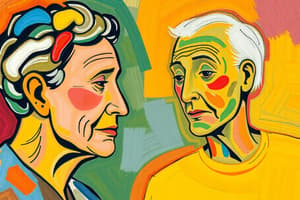Podcast
Questions and Answers
What is the impact of cognitive memory losses on an individual's ability to learn new information and perform daily tasks?
What is the impact of cognitive memory losses on an individual's ability to learn new information and perform daily tasks?
Cognitive memory losses may impede an individual's ability to learn new information and perform daily tasks due to the deterioration of short-term memory.
How does the loss of independence in old age affect an individual's daily life and sense of purpose?
How does the loss of independence in old age affect an individual's daily life and sense of purpose?
The loss of independence in old age can make it difficult for an individual to drive, travel, or carry out everyday tasks on their own, leading to feelings of isolation and a loss of sense of purpose.
What are the potential consequences of the loss of loved ones on an individual's social network and emotional well-being?
What are the potential consequences of the loss of loved ones on an individual's social network and emotional well-being?
The loss of loved ones can result in feelings of isolation or loneliness, as well as a diminished social network, leading to a decline in an individual's emotional well-being.
How does the decline in cognitive flexibility in old age affect an individual's ability to adapt to new situations and make decisions?
How does the decline in cognitive flexibility in old age affect an individual's ability to adapt to new situations and make decisions?
What are the potential implications of retirement on an individual's sense of purpose and identity?
What are the potential implications of retirement on an individual's sense of purpose and identity?
How do older adults often respond to the rising awareness of death in their lives?
How do older adults often respond to the rising awareness of death in their lives?
What influences can shape an individual's perception of death across their lifespan?
What influences can shape an individual's perception of death across their lifespan?
Why may a genuinely religious person, regardless of age, have a distinct view of death?
Why may a genuinely religious person, regardless of age, have a distinct view of death?
What is a common misconception about the healthcare system's response to patient death?
What is a common misconception about the healthcare system's response to patient death?
What might be a primary concern for individuals in extreme old age as they approach death?
What might be a primary concern for individuals in extreme old age as they approach death?
What is the primary concern underlying the fear of living an unfulfilled life, and how can this fear be relevant to nursing practice?
What is the primary concern underlying the fear of living an unfulfilled life, and how can this fear be relevant to nursing practice?
In what ways can physical losses, such as declining strength and mobility, impact older adults' daily lives and increase their vulnerability?
In what ways can physical losses, such as declining strength and mobility, impact older adults' daily lives and increase their vulnerability?
How can a nurse's own beliefs and attitudes about death influence their ability to provide effective care to patients experiencing loss, and what strategies can be employed to address this?
How can a nurse's own beliefs and attitudes about death influence their ability to provide effective care to patients experiencing loss, and what strategies can be employed to address this?
What are some potential spiritual implications of physical losses associated with aging, and how can nurses address these implications through spiritual nursing interventions?
What are some potential spiritual implications of physical losses associated with aging, and how can nurses address these implications through spiritual nursing interventions?
What are some key considerations for designing effective intergenerational programs that address the developmental aspects of old age, and how can these programs promote healthy aging and reduce disparities?
What are some key considerations for designing effective intergenerational programs that address the developmental aspects of old age, and how can these programs promote healthy aging and reduce disparities?
What are the primary factors that gerontological nurses should consider when assessing grief in older adults?
What are the primary factors that gerontological nurses should consider when assessing grief in older adults?
What type of individuals are most in need of sensitive gerontological nurses and expert interventions of grief counselors?
What type of individuals are most in need of sensitive gerontological nurses and expert interventions of grief counselors?
What is the primary goal of grief assessment in older adults?
What is the primary goal of grief assessment in older adults?
Why is it important for gerontological nurses to evaluate how older adults experience and express grief following a loss?
Why is it important for gerontological nurses to evaluate how older adults experience and express grief following a loss?
What support do nurses need when caring for poor copers?
What support do nurses need when caring for poor copers?
What are some potential benefits of intergenerational contact in long-term care facilities, and how can these benefits be maximized in program design?
What are some potential benefits of intergenerational contact in long-term care facilities, and how can these benefits be maximized in program design?
How can gerontological care providers incorporate spiritual nursing interventions into intergenerational programs, and what are the potential benefits of doing so?
How can gerontological care providers incorporate spiritual nursing interventions into intergenerational programs, and what are the potential benefits of doing so?
What are some potential pitfalls of intergenerational contact in long-term care facilities, and how can these be mitigated in program design?
What are some potential pitfalls of intergenerational contact in long-term care facilities, and how can these be mitigated in program design?
How can an understanding of developmental aspects of old age inform the design of effective intergenerational programs, and what are some key considerations for care providers?
How can an understanding of developmental aspects of old age inform the design of effective intergenerational programs, and what are some key considerations for care providers?
What are some key principles for designing effective intergenerational programs in long-term care facilities, and how can these principles be applied in practice?
What are some key principles for designing effective intergenerational programs in long-term care facilities, and how can these principles be applied in practice?
What is the primary distinction in the comprehension of death between young children and elderly kids and teenagers?
What is the primary distinction in the comprehension of death between young children and elderly kids and teenagers?
What might trigger young adults to focus on their mortality more acutely?
What might trigger young adults to focus on their mortality more acutely?
At what stage of life do individuals typically begin to reflect on their own wellbeing and impending death?
At what stage of life do individuals typically begin to reflect on their own wellbeing and impending death?
What is a common consequence of the loss of loved ones on an individual's emotional well-being?
What is a common consequence of the loss of loved ones on an individual's emotional well-being?
How might intergenerational contact influence an individual's perception of death and dying?
How might intergenerational contact influence an individual's perception of death and dying?
What is a key benefit of spiritual nursing interventions in gerontological care?
What is a key benefit of spiritual nursing interventions in gerontological care?
What is a critical aspect of designing effective intergenerational programs?
What is a critical aspect of designing effective intergenerational programs?
How can gerontological care and assessment be influenced by an individual's spirituality and beliefs about the afterlife?
How can gerontological care and assessment be influenced by an individual's spirituality and beliefs about the afterlife?
What is a potential pitfall of intergenerational contact in the context of death and dying?
What is a potential pitfall of intergenerational contact in the context of death and dying?
How can the developmental aspects of old age inform our understanding of an individual's perception of death and dying?
How can the developmental aspects of old age inform our understanding of an individual's perception of death and dying?
How can an older adult's physical health status influence their grief responses, and what are the implications for gerontological care?
How can an older adult's physical health status influence their grief responses, and what are the implications for gerontological care?
What are the key differences between normal grief and complicated grief in older adults, and how can they be distinguished?
What are the key differences between normal grief and complicated grief in older adults, and how can they be distinguished?
How can cognitive impairments impact an older adult's ability to process and express emotions related to loss, and what are the implications for assessment and support?
How can cognitive impairments impact an older adult's ability to process and express emotions related to loss, and what are the implications for assessment and support?
What is the significance of attachment to the deceased in understanding the potential impact of loss on an older adult, and how can this be taken into account in gerontological care?
What is the significance of attachment to the deceased in understanding the potential impact of loss on an older adult, and how can this be taken into account in gerontological care?
How can depression be distinguished from grief in older adults, and what are the implications for support and treatment?
How can depression be distinguished from grief in older adults, and what are the implications for support and treatment?
Flashcards are hidden until you start studying




